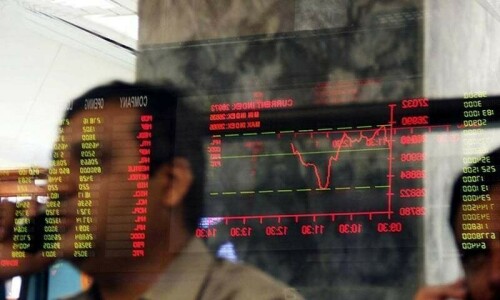KARACHI: The State Bank’s foreign exchange reserves dropped by $237 million to $7 billion in the week ending Dec 1, the central bank said in a statement on Thursday, as debt servicing on foreign loans continues to eat up SBP’s holdings.
The country’s total liquid foreign reserves stood at $12.1bn, including $5.09bn held by commercial banks, the central bank said. The SBP has now lost more than $1.7bn since mid-July.
The exchange rate looks stable, but increasing debt servicing costs without significant inflows have put the economy at risk.
The World Bank’s regional vice president for South Asia, Martin Raiser, recently said in an address to economists that Pakistan’s economy was stuck in a low-growth trap with poor human development outcomes and increasing poverty.
Ongoing debt servicing continues to erode central bank’s foreign holdings
He said the economic conditions leave Pakistan highly vulnerable to climate shocks with insufficient public resources to finance development and that international experience suggests that domestic debt reprofiling did not always work unless associated with sharp and sustained structural reforms. He said the IMF had identified the need for reforms over three to four decades ago, but they were still pending
With the formation of the Special Investment Facilitation Council (SIFC), the government aims to bring up to $100bn in investments in the next three to five years, particularly from the Middle East.
Memorandums of understanding (MOUs) have been signed with the UAE, Kuwait and Saudi Arabia for billions of dollars, which has helped stabilise the domestic market while the stock exchange has been crossing one milestone after another. However, the anticipated $700m from the IMF is yet to materialise. While these funds could bolster the SBP’s reserves, ongoing debt servicing may continue to erode them.
Currency dealers in the interbank market have pointed out several times that the State Bank has been buying dollars for debt servicing and to keep the reserves at the current level. This buying has resulted in a tight grip over imports, which fell by 17.3 per cent year-on-year to $21.5bn during the first five months (July to November) of the current fiscal year.
This steep decline in imports with a slight improvement of exports by 1.9pc reduced the trade deficit by 33.6pc, or $9.4bn.
“Not only are the importers in trouble, but the State Bank has grossly restricted the profits outflows,” said a senior banker dealing with the foreign exchange.
In July-October, the outflows for profits and dividends were $485m compared to just $71m in the same period a year ago.
“The outflows of profits were relaxed before the IMF talks,” the banker said, adding that this could again hurt the foreign direct investment inflows. Pakistan received just $524m in FDI during July-October, an annual increase of just 7pc.
Adding to the concerns, the country’s foreign debt and liabilities rose by $3.48bn, reaching $128.09bn in the first quarter of FY24.
Published in Dawn, December 8th, 2023














































Dear visitor, the comments section is undergoing an overhaul and will return soon.